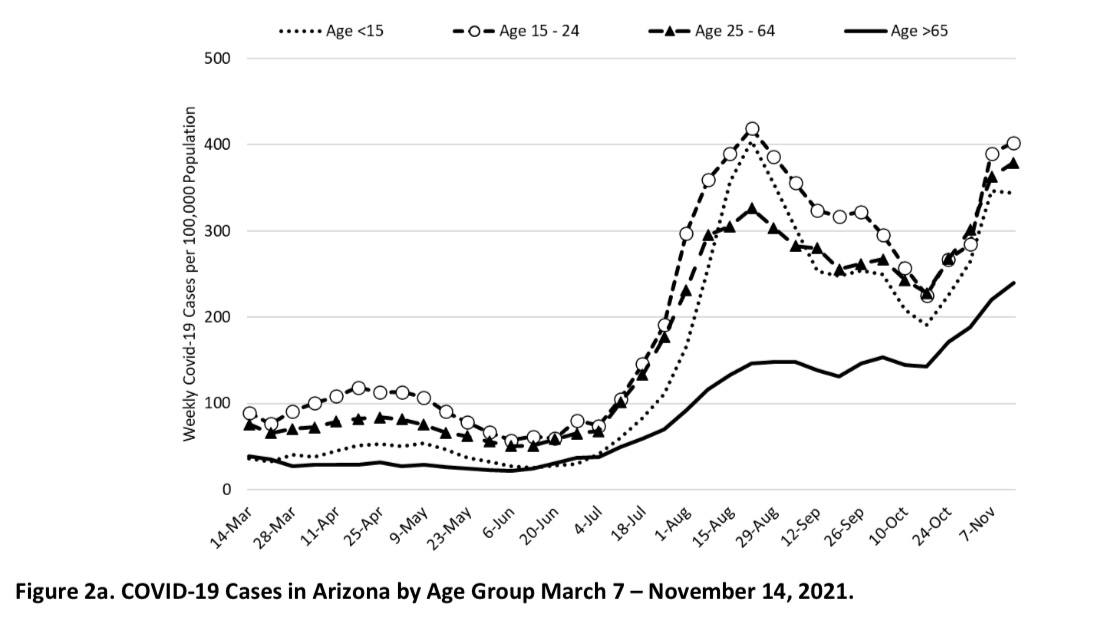With two potential new medications to treat COVID19 infections on the horizon, I thought I’d do an estimate of the financial return on investment for the various treatments and compare that to the ROI for the vaccines. Here goes:
Average COVID19 Hospitalization Costs
To do the back of the envelope ROI math, we’ll need to start with what an average COVID-19 hospitalization costs for unvaccinated persons. CMS found that the Average Medicare payment per fee-for-service COVID-19 hospitalized Medicare beneficiary is $24,033 (see this COVID19 Data Snapshot Public Release). According to Fair Health, an independent nonprofit focused on enhancing price transparency in healthcare, the average charge for COVID-19 hospitalization in Arizona is $361K for complex patients and $42K for non-complex patients. To be conservative, let’s go with the number from CMS… $24K.
Return on Investment for Regeneron
Let’s start with Regeneron, the monoclonal antibody treatment for which governor Ducey is such an enthusiast. Regeneron’s clinical trial found that their hospital-administered monoclonal antibody treatment reduces COVID-19-related hospitalization or deaths in high-risk patients by about 70%.
The federal government pays Regeneron Pharmaceuticals $2,100 per treatment course for the drug. Because it needs to be administered in a clinical setting, the actual full cost of a treatment course is about $10,000.
If Regeneron were administered to 1,000 patients at high risk of a bad outcome and it’s truly 70% effective at preventing hospitalization, Regeneron would bring down hospital costs from $24M to about $7.2M, a hospitalization savings of about $16.8M. Regeneron costs about $10M to administer to 1,000 patients… so we need to add that in to the costs too. At 70% effectiveness, the ROI for Regeneron would be about 1.6. In other words, for every dollar we spend on Regeneron administration to patients at high risk of hospitalization we only get $1.60 back in reduced hospital costs for COVID patients.
Editorial Note: Regeneron is being over-administered in Arizona. Low-risk persons are routinely receiving treatment with Regeneron because of the financial incentives established by Governor Ducey in this Executive Order. The ADHS is reinforcing the over-administration of Regeneron by peppering their letters to hospitals (which they regulate) encouraging Regeneron administration. Because this very expensive treatment is routinely being administered to low-risk persons, the ROI for Regeneron is actually below 1.
Return on Investment for the New Antivirals
Both Merck and Pfizer have stated that they have developed antiviral pills that are about 90% effective at preventing hospitalization from a COVID-19 infection if taken early in the infection. Both companies have asked the FDA for emergency use authorization of their new medications, but neither have published their trial data in a peer-reviewed journal.
The FDA is holding a meeting of their Antimicrobial Drugs Advisory Committee Meeting today to discuss Merck’s antiviral (molnupiravir) pills for treatment of COVID-19. View the evidence published by the FDA on this application here.
The use of Merck & Pfizer antivirals haven’t been authorized yet, but the federal government has already contracted with Pfizer $529 and Merck $700 per treatment course.
Let’s assume that the materials the FDA just posted are correct, and Merck’s pills are 90% effective at preventing hospitalization or death among patients that are high-risk for hospitalization. If either of these medications were administered to 1,000 patients that would have otherwise been hospitalized (and the meds are really 90% effective) the drugs would bring down hospital costs from $24M to about $2.4M, a savings of about $21.6M.
But… the drugs will cost an average of $600 to administer to each person ($600,000 total for 1,000 people), so at 90% effectiveness and $600 per treatment regimen, the ROI for these antivirals would be about 40 if given only to patients at high-risk for hospitalization. In other words, for every dollar we spend on the future Merck or Pfizer antiviral pills we’d get about $40 back in reduced hospital costs among high-risk COVID patients.
Return on Investment for Vaccines
The federal government’s contract with Pfizer, Moderna, and Johnson & Johnson is about $20 per vaccine dose. There’s also an administration cost for the vaccine. For example, Medicare reimburses providers $40 per COVID19 vaccine administered.
Putting those costs together, a 2-dose series of the mRNA vaccine costs the taxpayers about $120. The mRNA vaccines are more than 95% effective at preventing hospitalization, but to be conservative, let’s say it’s just 90%.
When either of the mRNA vaccines are administered to 1,000 people who would have otherwise become infected and hospitalized (even at only at 90% effectiveness), hospital costs would go down from $24M to about $2.4M, a savings of $21.6M.
The vaccines cost an average of $120 to administer to each person ($120,000 total for 1,000 people), so at 90% effectiveness and $120 per full vaccination the ROI for the mRNA vaccines would be about 180. In other words, for every dollar we spend on vaccinating folks with the mRNA vaccines we’d get $180 back in reduced hospital costs for COVID patients. (Note: the ROI is actually higher than 180 because vaccines not only prevent bad outcomes but also reduce community spread).
Editorial Note: Vaccines are far and away the most cost-effective way to save lives and reduce healthcare costs. The President is doing what he can to implement policies that will drive up vaccination rates via the new OSHA and CMS regulations. Governor Ducey and Attorney General Brnovich, on the other hand, are doing what they can to stop the White House proposals and are actively taking steps to prevent vaccination requirements.
A true fiscal conservative would look at the 180+ ROI for vaccines, compare that to the 1.6 ROI for Regeneron and do everything he or she could to get more people vaccinated.




